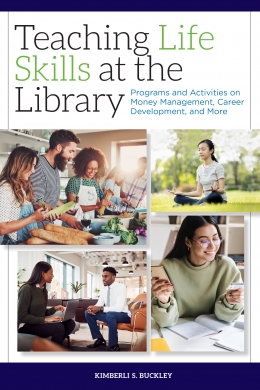
Primary tabs
You don't need to be an ALA Member to purchase from the ALA Store, but you'll be asked to create an online account/profile during checkout to proceed. This Web Account is for both Members and non-Members. Note that your ALA Member discount will be applied at the final step of the checkout process.
If you are Tax-Exempt, please verify that your account is currently set up as exempt before placing your order, as our new fulfillment center will need current documentation. Learn how to verify here.
- Description
- Table of Contents
- About the author
- Reviews
Mastering life skills such as financial management, career development, cooking, and self-care is important for young and emerging adults as well as older patrons. This book guides libraries towards providing programs and activities that help their users expand these life skills and accomplish their goals.
Between making financial decisions, maintaining a healthy work–life balance, and juggling health, family, friends, and other responsibilities, life can feel overwhelming. Place these same responsibilities on an individual just entering adulthood who has less real-life experience and it can feel even more overwhelming. So why not make sure our teens and young adults are more prepared to face the world before they go out on their own? How can we also reinforce these skills for adults who may never have learned them or who may need a refresher? This book provides a hands-on and interactive approach to creating and planning library programs and activities that will enable patrons to learn and build the most important life skills. Readers will discover
- how life skills library programs can encourage participants to imagine and prepare for real-world situations;
- a rich variety of step-by-step programs, complete with planning tips, instructions, and a materials and equipment list, for activities such as Mock Job Interviews, Financial Literacy Jeopardy, planning of week of dinners, Spring Cleaning Visualizations, the art of packing a suitcase, practicing self-care, a stress-relief dance party, and many others;
- advice on planning, partnership opportunities, promotion, evaluations, and sustainability;
- ways to promote a safe space and a relaxed environment while leading programs; and
- additional helpful resources, including a planning template and reading tie-ins.
Preface
Acknowledgments
Introduction: You’ve Got This!
Part I Planning Life Skills Programs
Chapter 1 Let’s Start Planning
Chapter 2 Partnership Opportunities and Program Promotions
Chapter 3 Evaluate and Sustain Your Life Skills Programs
Part II Life Skills Activity Plans
Chapter 4 Jobs
Chapter 5 Money
Chapter 6 Cooking
Chapter 7 Self-Care
Chapter 8 Personal Care
Chapter 9 Home Skills
Chapter 10 Communication
Chapter 11 Relationships with Friends and Family
Chapter 12 Stress Management
Conclusion: Taking Care of Business
- Appendix A: Planning Template for a Life Skills Program
- Appendix B: Reading Tie-Ins
Index
Kimberli S. Buckley
Kimberli S. Buckley has over fifteen years of experience in the library field working with teens and adults. She is currently the library manager at Concord Library in Contra Costa County, California. Kimberli has a passion for teaching classes on life skills for emerging adults. She teaches at San Jose State University’s School of Information and also teaches an online class called Growing Up Is Hard. She loves to be creative when it comes to library programming, and she has been known to tap into her inner unicorn to bring all her ideas to life. Kimberli has an MLIS degree from San Jose State University and an MA in consciousness studies from John F. Kennedy University.
Have you read this book? Leave a review!
"This useful hands-on guide is recommended for librarians, educators, and human-services providers with minimal programming experience working in communities that lack life-skills training opportunities."
— Library Journal
"Buckley is a public library manager who teaches classes on life skills for emerging adults, inspired by a high-school teacher’s request to fill a gap for her students. These experiences are the basis for this book. She notes the importance of teaching life skills in the library in terms of community relations and community improvement ... The author’s tone is informal, yet informed. In short, she provides useful tips to help librarians plan and deliver engaging, practical—and doable—life skills programs.”
— Booklist


